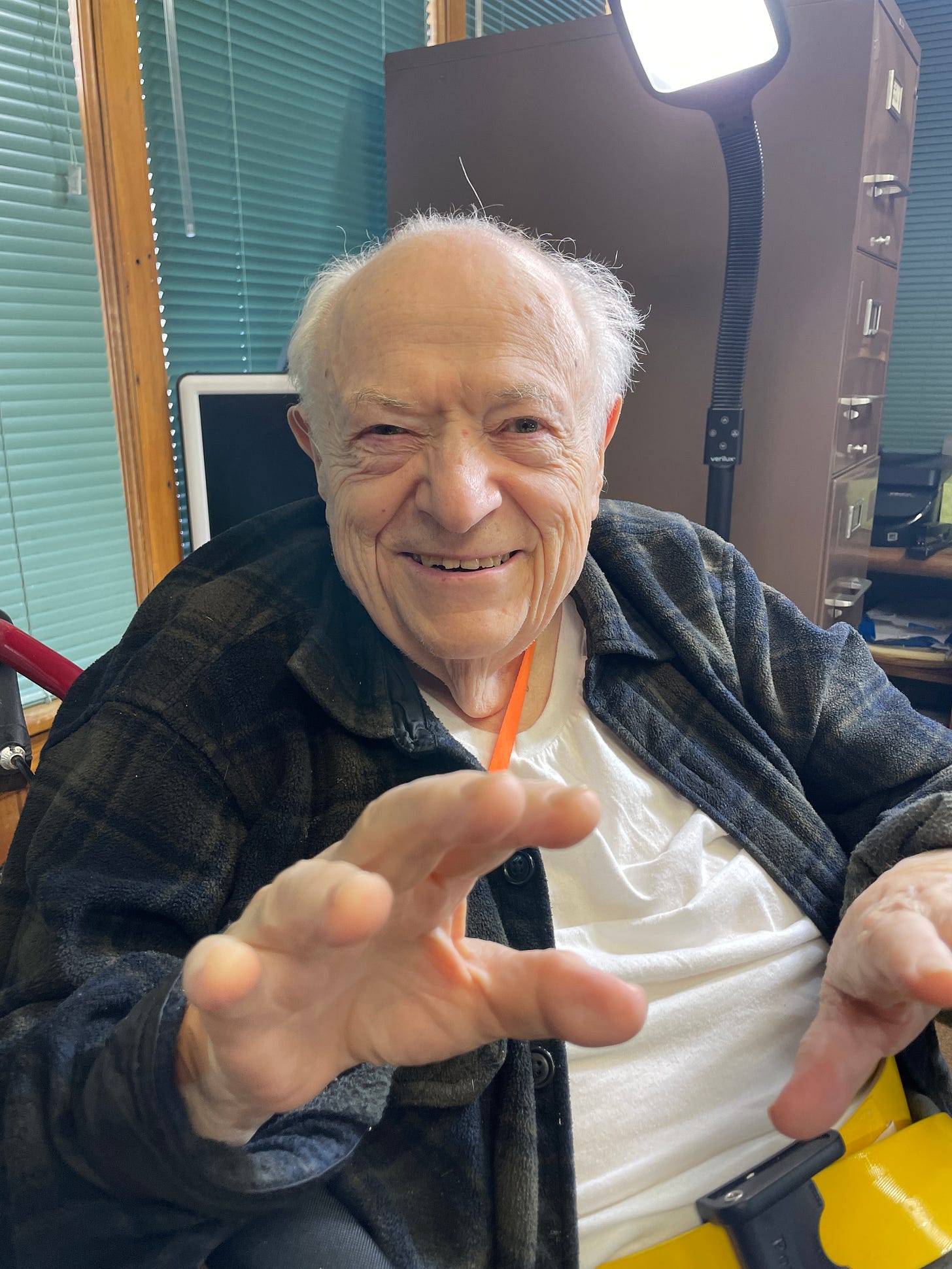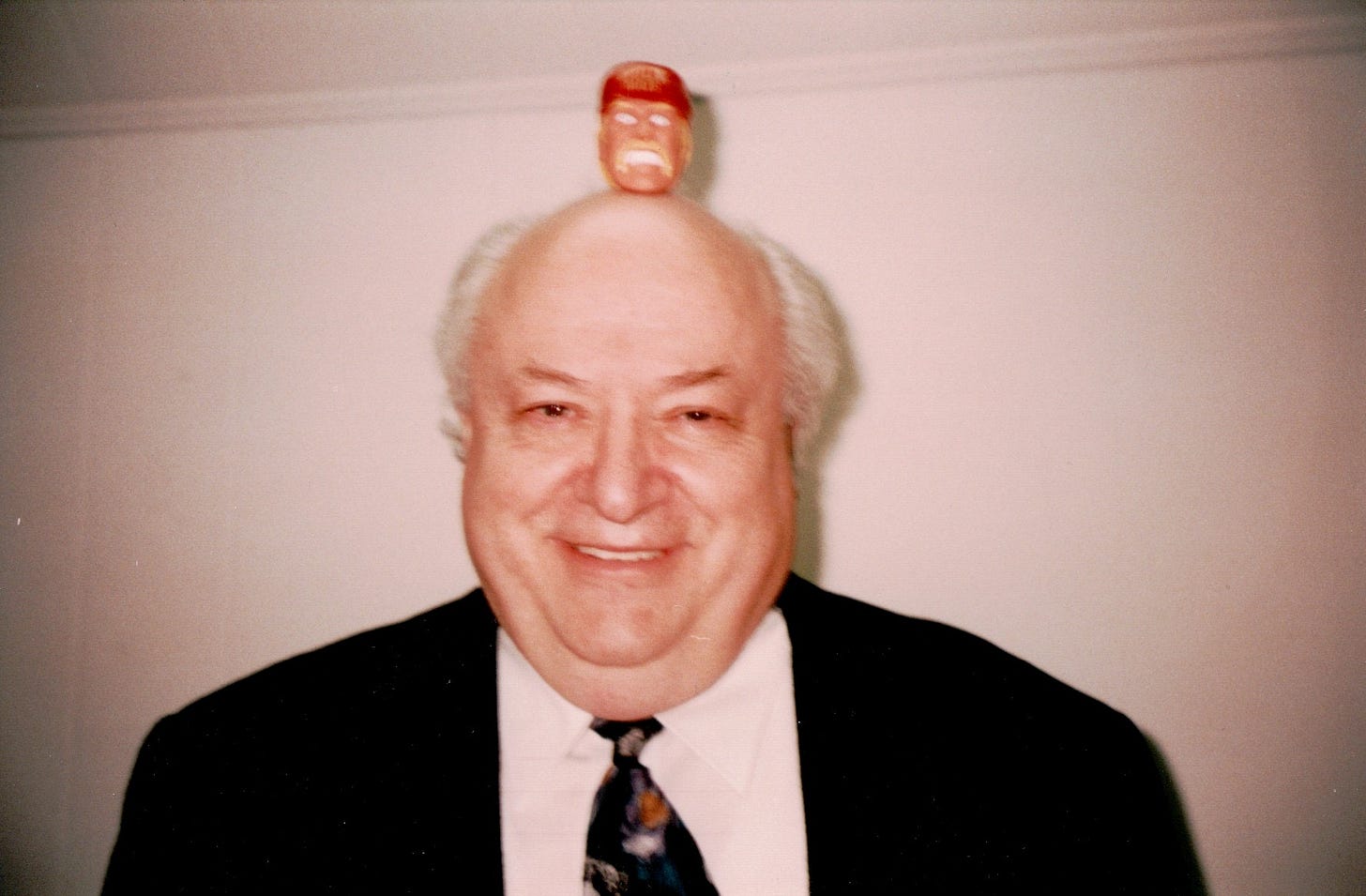Zaid
The man who disproved the Asshole Theory of Big Guyism
My family lost a fixture in our lives on November 16. My grandpa/zayde, Peter Miller, AKA Pedro, AKA Zaid, died at 92.
Zaid had overcome so much in his life, I entertained the idea that maybe he wouldn’t die, or couldn’t. As recently as a few weeks ago, he was his normal self, struggling with severe pain, still clocking in with a memory that I joked was better than my own. (It wasn’t a joke, though. He remembered every detail of my brother’s and my lives and those of our girlfriends and their families. He knew my touring schedule better than I do. He would ask about our pets.) His body preceded his mind in decay, which made me weep a lot. But I remind myself that no one gets to scrape the very bottom of the barrel of their mental or physical abilities. There’s almost always a little, or a lot, left of one or the other, and I’m grateful Zaid had such a long supply of both.
If you watched the Tweedy Show or saw one of his gushing comments on this Substack, you know he was a loving, devoted, almost pathologically supportive person. As I’ve been reflecting on what made Zaid Zaid, trying to distill him, I keep coming back to his freely given love and affection, his utterly unselfconscious, un-needy, unabashed celebration of all his friends and family.
It was something to behold and even more special in light of the era he was born in, and the family business world he spent his adult life in. Every force in twentieth-century America could have turned him into a callous man, could have stuffed him into the mold of a person with dreams of massive success, which he carried. But he was immune to such fool’s gold. He wanted to earn a bajillion dollars to leave for his kids, but I don’t think a single cell in his body would have allowed him to become an unaffectionate, cold, or withholding person in pursuit of it. He was too bright, too generous.
Luckily, he didn’t need to fit that mold to reach a certain kind of success. Not of the scale he had in mind, but one that would amaze any onlooker. He grew up often without a bed to sleep in, evicted from apartments with his single mom (who was eventually institutionalized by the state, orphaning him), sometimes sleeping on the train and subsisting on onion-and-mustard sandwiches. Before he was thirteen, he’d been an egg candler, an usher, and a deli worker, where his job included reaching his arm deep into barrels of pickled herring, despite his life-threatening allergy to fish. While still in high school, he worked double shifts as a soda jerk at a Walgreens pharmacy and made enough money to buy his first car and then eventually, with his lifelong friend Merwin, a used car business (at Kimball and Elston in Chicago, if you’re familiar). After he met my bubbe, Judy, he ran and co-owned a department store owned by her dad and uncles for years, before finally founding burglar alarm companies, Security Systems Incorporated and University Security Systems. He held a patent for the first cellular alarm system. Security Systems was eventually valuable enough to sell to a local competitor, which he did in the aughts.
All those endeavors qualified him as an American success, even if he didn’t always see himself that way. And they gave him the satisfaction of good work.
But more important than any earnings—as my family and I repeatedly reminded him, begging him to feel accomplished, insisting he’d adequately taken care of all of us, encouraging him to be as nice to himself as he is to others—was his success of heart. He had three children with whom he talked, who wanted to talk to him, every. single. day. (Seriously: as long as my mom and her brothers were within earshot of a phone, they could count on a bright, sonorous “Hi there!” reaching them from the other end of the line every night.) Three people who’d gone out in the world with the security and encouragement that can only come from a figure who’s always there, always believing. That was his most important accomplishment. The closeness.
And I’m in awe of his perseverance. Through the childhood deprivation, but also macular degeneration which made him blind since his sixties, divorce and betrayals, and in the last year, the loss of his ability to walk. He never wallowed in self-pity. He worked his ass off, still trying to create a fortune from the confines of his home office, at his comically large desk, just for the sake of Susie, Danny, and Bruce. It tore us up to see him struggle with unlikely schemes, like new security systems designed for postal workers, universities, and manhole covers, but we also knew the effort probably prolonged his life.
Going forward, I’m carrying with me Zaid’s total saturation of affection. He was strong, he was confident, he spoke surely and considerately. But he was silly, positive, generous, and weepy. I don’t know why we see those things as contradictions. Call it the Asshole Theory of Big Guyism: that you need to be an asshole to be a boss. Zaid was a walking, kissing, hugging, singing, joke-telling, crying, Yiddish- and Spanish-speaking negation of the Asshole Theory. He understood that giving himself did not diminish himself. He showed my brother and me the way. He made everyone brighter with his brightness. And we’ll always have his booming voice, his “never better!”s, his sweet demeanor ringing in our hearts.
My dad, my uncle Danny, and my brother Sammy each wrote beautiful tributes to Zaid:
Jeff’s
Danny’s
Sammy’s
Donations in Zaid’s honor can be made to Emanuel Congregation or Letters to Santa Charity.
Pedrobot for life.
Love,
Spencer








When you mentioned “the closeness” as his main accomplishment it clicked for me with why The Tweedy Show worked so spectacularly. You all were able to transmit that feeling of closeness to all of us through our silly electronic devices, at a time where physical closeness was strictly prohibited. Your grandfather clearly had so much love to give and clearly left an impact on so many people. What a gift he was. This was a moving tribute, Spencer, and my continued best to you and all of your family who mourn his loss, but celebrate all of that love and closeness
Aw, what a great remembrance. I bet Peter wrote the best letters back in the pre-Internet days when we put actual pen to paper. Re-reading some of his replies to your posts, he just seemed to have that way about him. It's something I've always admired. I also think it's telling that he worked with security systems for a good part of his life (and was still coming up with ideas in that vein) because it seems like that's what he wanted most for his family was for you guys to all be happy and secure. What a protective and generous spirit he had. Viva Pedrobot!